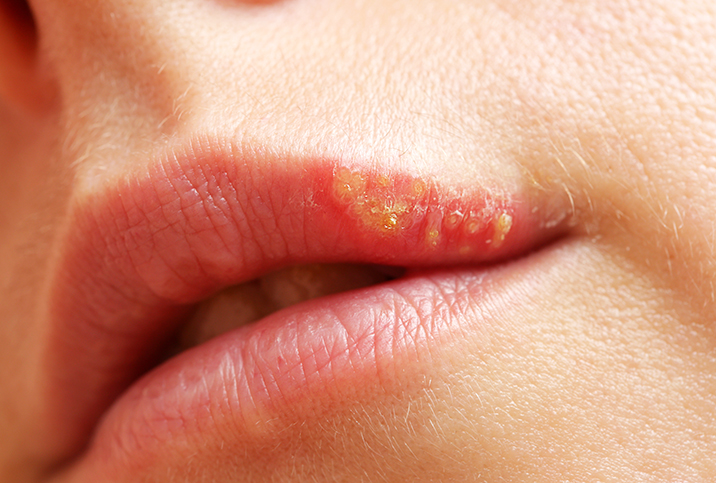The Internet Is Pushing to Destigmatize HSV-1 and HSV-2

Often deployed as a punchline or insult, the sexually transmitted disease herpes remains a hot button topic in media, film and television. Historically, it's been understood as something uncontrollable and dangerous, stoking people's fears. As society progresses scientifically, making strides in the medical field toward treating longer-lasting STDs/STIs, content creators are spreading information about herpes intended to normalize—and not stigmatize—the disease.
It's really not that funny
There's a definite distinction between HSV-1 and HSV-2.
HSV-1 primarily causes oral herpes or cold sores and affects 50 percent to 80 percent of American adults. It is spread from one person to another via kissing or oral sex, whereas HSV-2 is typically contracted via vaginal, anal or oral sex.
HSV-2 has been on the rise since the 1980s, jumping 30 percent during that decade, corresponding to 45 million people affected in the noninstitutionalized civilian population. This translates to roughly 1 in 5 people being affected by the disease—a huge number of people to dismiss with a punchline.
"Herpes is always the easiest thing to make a joke about," said Alex Collyard, a comedian and TikTok influencer who has recently started posting about his own journey with herpes. "It's jokes about how people are clingy 'like herpes' or something along those lines, and it's the only thing you ever hear about—that it's forever and there's no cure."
Despite its history as a comedic punching bag, online influencers have begun talking earnestly about living with herpes, turning the tide toward a future filled with positive conversations about the disease.
"The sex community I'm a part of has seen a lot of people take to the internet to be at the forefront of reframing herpes," said Melissa Novak, a licensed clinical social worker (LCSW) and certified sex therapist based in Chicago, Illinois. "TikTok serves as that intimate platform for a lot of people to hear creators talk about living with the disease and how they're beautiful despite what others say."
Social healing with social media
Well-known TikTok accounts (and those who have become well-known through this endeavor) have taken to speaking openly about herpes and people's long-held misconceptions.
After years of being shamed, ghosted and insulted for having herpes, people like Suzanna Brusikiewicz (@suzbub on TikTok) are taking to the internet to openly discuss a disease they've been taught to look at with disgust. This liberation can be incredibly cathartic for people living with the disease.
"I always get people hitting me up being, like, thank you for talking about it online," Collyard said. "That's really nice. It's nice to not feel disgusted about it."
With its capacity to widely and quickly disseminate information, social media has reclaimed the negative association often linked with herpes. Among the false rumors long perpetuated by local and national news outlets and the internet, the overblown stigma of herpes has started to come in check. TikTok and Instagram have provided powerful public forums describing how common herpes is, how to treat it and how to communicate honestly with your partner about safe sex going forward.
Of course, the toll this negative stigma takes on the people afflicted can still affect relationships and self-image. People may balk at the idea of dating someone with herpes or worse, even going as far as cutting off a relationship entirely at the prospect of catching the disease.
"I remember I had this friend 15 years ago who went on a date with this one woman, who was incredible, and after figuring out she had herpes, he cut the relationship off," Novak said. "It was a bummer because so much time has passed and he still remembers that connection. He shut a door on love."
Instead, a new school of people with herpes want to turn the disclosure of their infection into a chance for connection and growth.
"In a weird way, it allows me to, like, kind of have a moment of vulnerability and build a little bit of trust with someone that I'm about to sleep with," Collyard explained. "The most common response I get from telling people is them being like, 'Thank you so much for telling me that. I really appreciate that.'"
Fake news and fear
The misinformation on herpes is not only stressful for people who have the disease, but is also harmful to younger generations. Limited resources to sex education exists in the United States, with only 13 states requiring sex education to be medically accurate.
The fight for comprehensive sex programs in America remains a hotly contested topic, a constant push and pull between how much parents want their kids to know about the birds and the bees versus not wanting to encourage promiscuity. Limiting this access to knowledge, however, results in a flawed society where known medical conditions are treated with fear, shame and disgrace.
"Most of us have had sex education that is intrinsically laden with morality. In a lot of areas, sex education is fear-based," Novak said. "People try to warn us about the dangers of sex without telling us how to deal with the consequences."
'People try to warn us about the dangers of sex without telling us how to deal with the consequences.'
Despite parents' apprehension, comprehensive sex education classes have shown remarkable results in curbing areas such as teen pregnancy, sexual risk behaviors and sexual assault. With the number of teenagers using platforms like Instagram and TikTok, if their school won't show up to the conversation, social media will fill the gap.
"On Instagram, sexual education accounts provide relatable and accessible information ranging from consent, mental health, contraception, relationship advice and more," wrote Julia Gonzalez for the website Power to Decide. "While social media has its share of flaws, it is clear that many users are creating a space for open dialogue about sexual health and using it to spread awareness and resources."
As we reexamine our dynamic with sexually transmitted diseases, we begin to unlearn toxic narratives about their impact. It shapes conversations going forward about how to effectively communicate with your partner about living with herpes, a vulnerable conversation that strengthens a relationship. Being receptive to, instead of dismissive of, your partner and taking the time to learn about herpes is necessary to the future of how we understand this and other sexually transmitted diseases.




















